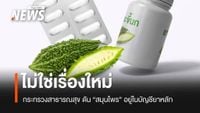On April 30, 2025, the Thai healthcare system finds itself embroiled in controversy over the recent policy shift by the Ministry of Public Health, which advocates for the use of Thai herbal medicine as an alternative to modern pharmaceuticals. This initiative has sparked intense debate among healthcare professionals and patients alike, as it raises questions about the efficacy and safety of herbal treatments compared to conventional medicine.
According to a report by Ch7, doctors are now permitted to prescribe herbal remedies such as bitter gourd, but many express concerns regarding the potential risks of substituting these traditional treatments for established medical practices. Dr. Atibaedee Krumkanpaet, a notable figure in Thai traditional and alternative medicine, emphasized the importance of using bitter gourd in conjunction with modern treatments. He stated, "Using bitter gourd together with patch adjustment will help reduce patients' suffering." This reflects a growing trend where traditional medicine is being integrated into mainstream healthcare.
The policy, however, is not without its critics. Medical professionals have raised alarms about the implications of relying on herbal medicine, particularly for patients with complex health issues. They argue that while herbal remedies can be beneficial, they should not replace modern treatments entirely. The concern is that patients may suffer if they are denied effective pharmaceutical options in favor of untested herbal alternatives.
In response to the mounting criticism, the Minister of Public Health clarified that the initiative is intended to support the use of Thai herbal medicine while not mandating its exclusive use. "This is merely an option to reduce the reliance on chemical substances," he remarked, urging the public and healthcare providers not to overreact. He emphasized that the integration of herbal medicine into the healthcare system is meant to complement, not replace, existing treatments.
Historically, the push for herbal medicine in Thailand is not a new phenomenon. The Ministry of Public Health has been advocating for the inclusion of herbal remedies in the national formulary since 2010, with a structured approach to research and development in this area. Dr. Narawatch Nawanukool, who was the Director-General of the Department of Thai Traditional and Alternative Medicine at the time, announced plans to propose five herbal items for inclusion in the national formulary back in 2009. This included well-known remedies such as Phet Sang Khat for hemorrhoids and Bua Bok for wound healing.
As of now, the national formulary includes a variety of herbal medicines, with 74 entries as of December 2023. This includes popular remedies such as Fah Talai Jone for respiratory issues and Turmeric for digestive problems. The continual addition of herbal treatments reflects the Thai government's commitment to promoting traditional medicine alongside modern healthcare practices. In fact, the Ministry has set a goal to incorporate at least five new herbal medicines into the national formulary each year, a strategy that aims to enhance patient care and reduce healthcare costs.
Despite the government's efforts, the integration of herbal medicine into standard practice has not been without challenges. Medical professionals must navigate the complexities of understanding both herbal and pharmaceutical treatments, which can lead to an increased workload and potential confusion. Dr. Somchai Nichapanit, the Director-General of the Department of Thai Traditional Medicine, acknowledged these challenges, stating that there needs to be a collaborative effort between practitioners of both medical disciplines to ensure patient safety and effective treatment strategies.
Furthermore, the recent policy has led to concerns about how hospitals will be evaluated in terms of their treatment offerings. If herbal medicine becomes a criterion for hospital funding, some fear it could pressure healthcare providers to prioritize herbal remedies over established treatments, potentially compromising patient care.
As the debate continues, many healthcare professionals advocate for a balanced approach that respects the value of traditional medicine while maintaining the integrity of modern healthcare. They suggest that both forms of treatment should be studied together, allowing for a more comprehensive understanding of how they can complement each other. This collaboration could ultimately lead to better outcomes for patients, as they would benefit from the best of both worlds.
In conclusion, the ongoing discussion about the role of herbal medicine in the Thai healthcare system highlights the need for careful consideration and collaboration among medical professionals. As the Ministry of Public Health pushes forward with its initiatives, the importance of evidence-based practice must remain at the forefront to ensure that patient welfare is prioritized above all.




